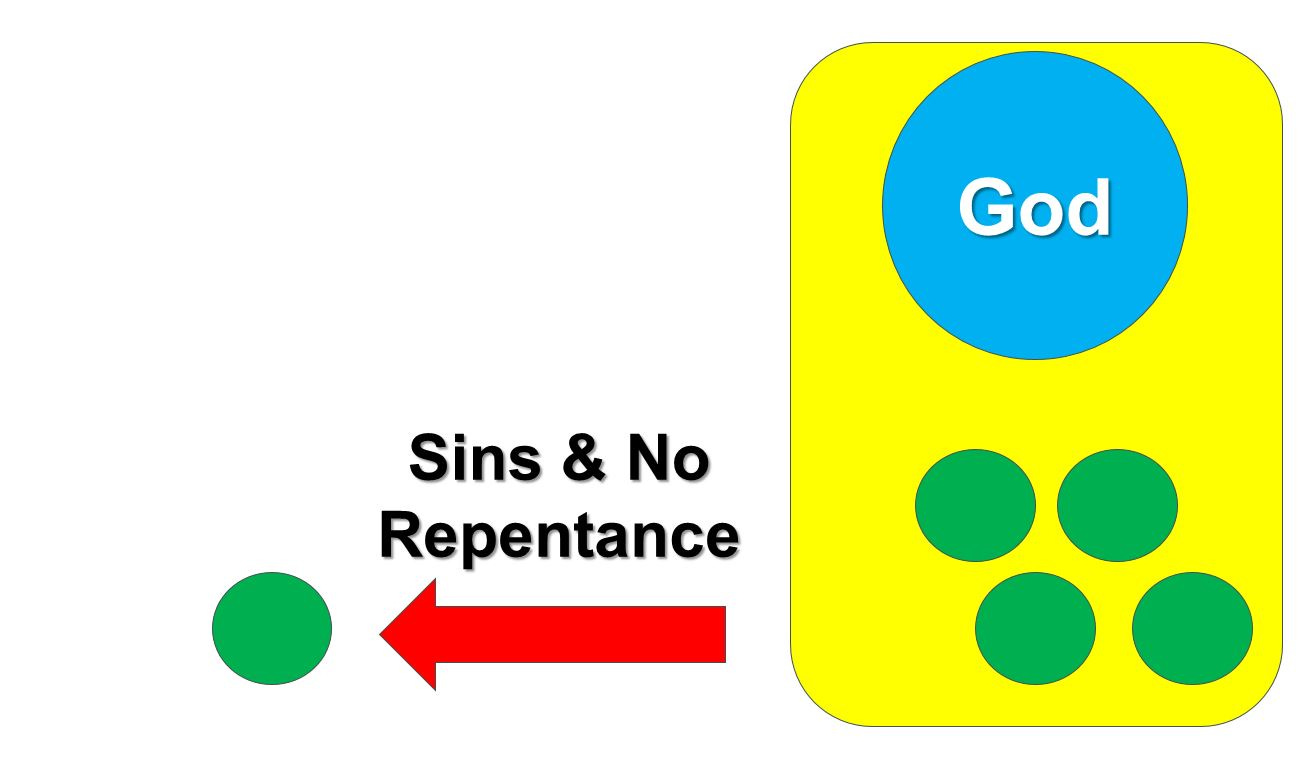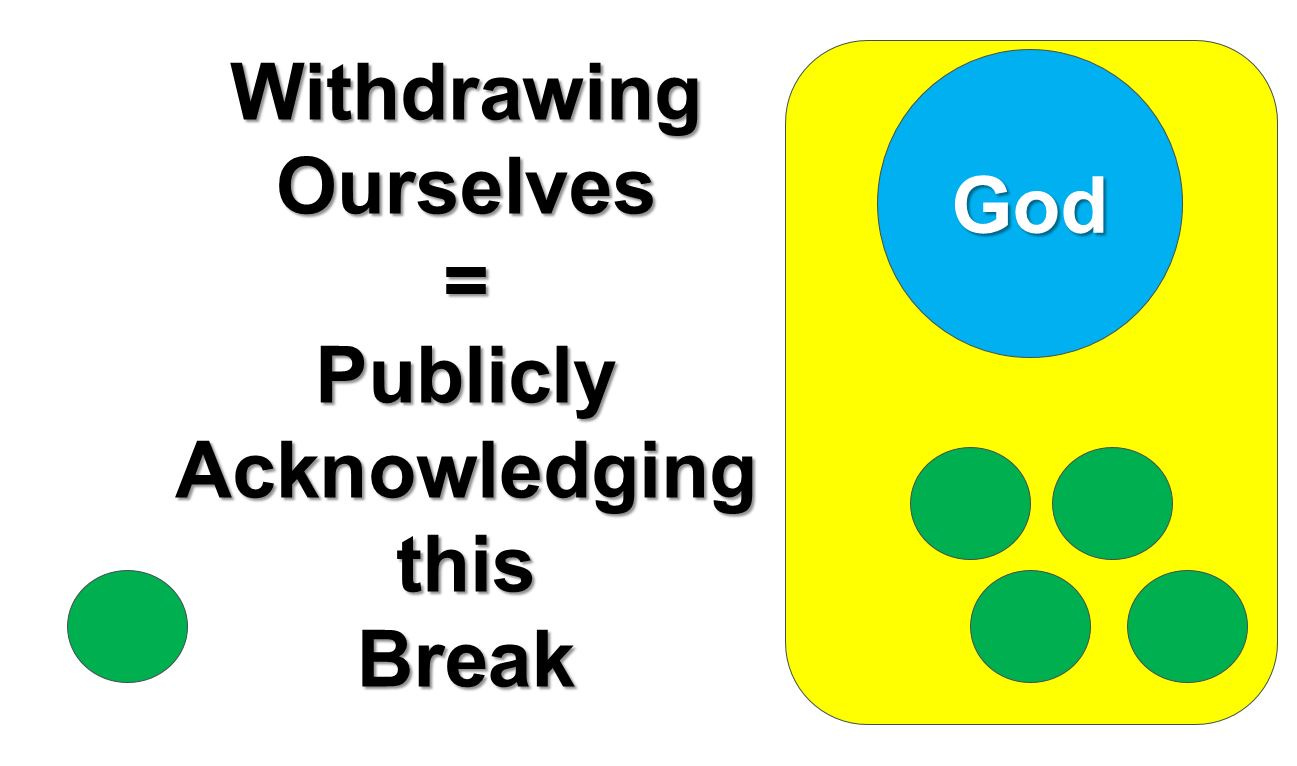What Does the Bible Say About Withdrawing Fellowship?
Why does God command Christians to do this?

The subject of withdrawing from a wayward Christian, or the practice of church discipline, is an emotionally charged topic - and frankly, it should be.
A church that can practice church discipline toward a brother or sister in Christ with cold indifference or with an arrogant “good riddance” has more problems than I could possibly deal with in one article.
Seeing a brother or sister turn away from God, refuse to repent, and suffer consequences because of their choices should sadden Christians and cause us to hurt deeply for our lost sibling.
I think it’s important to point out that withdrawing fellowship is not the church “banning someone.” It’s the church recognizing that a brother or sister has left God, and his or her fellowship with God and us has been broken.
Perhaps the illustrations below will be helpful.
Withdrawal of Fellowship Illustrated.
John explains in 1 John 1:5-2:2 that faithful Christians are walking in the light with God, continue to have fellowship with Him, and continue to be forgiven by the blood of Jesus as they confess their sins.
However, if Christians sin and refuse to repent and turn away from their sin - they leave God and all those who are walking in the light with God.
Withdrawing fellowship occurs after repeated efforts to turn the rebellious Christian back to the Lord have failed. It’s about publically acknowledging that the brother or sister has refused to repent, and continues in their sin.
While I hope these illustrations are helpful, we need to turn our attention to the Scriptures to be better informed about withdrawing fellowship. From several passages in the New Testament, we’ll notice what must be done, why it must be done, and how it must be done.
What Must Be Done.
First, we’ll start with the words of Jesus Himself.
"Moreover if your brother sins against you, go and tell him his fault between you and him alone. If he hears you, you have gained your brother. But if he will not hear, take with you one or two more, that 'BY THE MOUTH OF TWO OR THREE WITNESSES EVERY WORD MAY BE ESTABLISHED.' And if he refuses to hear them, tell it to the church. But if he refuses even to hear the church, let him be to you like a heathen and a tax collector.
"Assuredly, I say to you, whatever you bind on earth will be bound in heaven, and whatever you loose on earth will be loosed in heaven. "Again I say to you that if two of you agree on earth concerning anything that they ask, it will be done for them by My Father in heaven. For where two or three are gathered together in My name, I am there in the midst of them." (Matthew 18:15-20)
Jesus wants to keep the matter as small as possible - beginning first on the individual level. If the sinner refuses to listen and repent, then bring an additional witness or two so that the facts of the matter can be established (Deuteronomy 19:15). This step prevents a false charge from spreading or from mob rule being the standard of “justice” in the church.
If the sinning brother or sister still doesn’t repent, the matter must be brought before the whole church, and the entire church is to get involved in lovingly urging the wayward brother or sister to repent of their sins (Galatians 6:1).
If none of that works, then Jesus says to let the brother or sister be “like a heathen and a tax collector.” In other words, don’t associate with them anymore.
After He describes what must be done, Jesus reassures that if His church follows His command through this difficult process, He is with them and they have His authority behind them.
Why It Must Be Done.
Next, we turn to what the apostle Paul writes to the church in Corinth. 1 Corinthians 5 is all about the issue of “withdrawing fellowship.”
It is actually reported that there is sexual immorality among you, and such sexual immorality as is not even named among the Gentiles—that a man has his father's wife! And you are puffed up, and have not rather mourned, that he who has done this deed might be taken away from among you. For I indeed, as absent in body but present in spirit, have already judged (as though I were present) him who has so done this deed. In the name of our Lord Jesus Christ, when you are gathered together, along with my spirit, with the power of our Lord Jesus Christ, deliver such a one to Satan for the destruction of the flesh, that his spirit may be saved in the day of the Lord Jesus.
Your glorying is not good. Do you not know that a little leaven leavens the whole lump? Therefore purge out the old leaven, that you may be a new lump, since you truly are unleavened. For indeed Christ, our Passover, was sacrificed for us. Therefore let us keep the feast, not with old leaven, nor with the leaven of malice and wickedness, but with the unleavened bread of sincerity and truth.
I wrote to you in my epistle not to keep company with sexually immoral people. Yet I certainly did not mean with the sexually immoral people of this world, or with the covetous, or extortioners, or idolaters, since then you would need to go out of the world. But now I have written to you not to keep company with anyone named a brother, who is sexually immoral, or covetous, or an idolater, or a reviler, or a drunkard, or an extortioner—not even to eat with such a person. For what have I to do with judging those also who are outside? Do you not judge those who are inside? But those who are outside God judges. Therefore "PUT AWAY FROM YOURSELVES THE EVIL PERSON." (1 Corinthians 5:1-13)
Paul gives at least four reasons why the church in Corinth needed to withdraw from this sinning brother - and the teaching still holds true for the Lord’s church today.
#1 – To expose sin.
Sin would much rather operate in the darkness and shadows. If we ignore sin, or “sweep it under the rug” and hope it simply “goes away” - we are playing right into the devil’s hand. Sin must be exposed.
For everyone practicing evil hates the light and does not come to the light, lest his deeds should be exposed. But he who does the truth comes to the light, that his deeds may be clearly seen, that they have been done in God. (John 3:20-21)
Withdrawing fellowship from a brother or sister who refuses to repent exposes the true seriousness of their sin, and no longer lets them practice their sin in the shadows.
And have no fellowship with the unfruitful works of darkness, but rather expose them. For it is shameful even to speak of those things which are done by them in secret. But all things that are exposed are made manifest by the light, for whatever makes manifest is light. Therefore He says: "Awake, you who sleep, Arise from the dead, And Christ will give you light." (Ephesians 5:11-14)
#2 - To restore the individual.
The entire church discipline process is done in the hopes of restoring the brother or sister in sin. That hope doesn’t end even if the church must withdraw from them.
Paul reminded the church in Corinth to withdraw from the brother engaging in sexual sin so “that his spirit may be saved in the day of the Lord Jesus” (1 Corinthians 5:5). Thankfully, 1 Corinthians 2:5-11 appears to describe this brother's repentance and Paul urges the Christians to forgive him.
Withdrawing from a brother or sister who refuses to repent is not done because the church no longer cares for them. Such a painful step is taken because the church is trying to get the sinner to see the error of their ways and repent before it’s too late.
We still love them and want them to be saved - just as God still loves them and wants them to be saved.
The Lord is not slow to fulfill his promise as some count slowness, but is patient toward you, not wishing that any should perish, but that all should reach repentance. (2 Peter 3:9)
#3 – To protect the church.
Much of Paul’s explanation for why the church in Corinth needed to withdraw from the sinning brother centered around the need to protect the rest of the church. The leaven must be removed from the dough, the sin must be removed from the camp.
After God gave the city of Jericho into the hands of the Israelites, they went into battle against a much smaller city named Ai. But shockingly the Israelites were routed by this tiny town, and Joshua goes to God and asks, “What’s going on??”
God replied that someone had taken items from Jericho that He had commanded them not to take. As a result, the Lord would not fight their battles for them until they dealt with the sin in the camp. They obeyed the Lord, dealt with the sin of Achan, and the Lord was with them in battle once again (Joshua 6-8).
When we study the seven churches of Asia in Revelation 2-3, we find that some of them had allowed sin into the church. Jesus warns them to repent or else He would come and deal with it Himself - He would fight against them, rather than for them.
The church in Corinth needed to withdraw themselves from the sinning brother to protect themselves from sin; to rid themselves of their sinful attitude of pride.
The church also must protect itself as the light and salt of the earth (Matthew 5:13-16). If the community looks to the church, but all they see are people who live no differently than anyone else in the world - how will the church ever reach anyone with the gospel message?
#4 – To warn of greater judgment to come.
Withdrawing from a brother or sister is a form of judgment practiced by the Lord’s church in submission to the Lord’s authority. But this also is a reminder of a greater judgment that is coming.
For we must all appear before the judgment seat of Christ, so that each one may receive what is due for what he has done in the body, whether good or evil. (2 Corinthians 5:10)
When the church must withdraw from a wayward brother or sister, it’s a reminder that one day we will all stand before the Judge of all the earth - who will do what’s right (Genesis 18:25).
Those who have left God and gone back into sin have left the cleansing blood of Jesus Christ (Hebrews 10:26-31) and have fallen from grace (Galatians 5:4).
It would be a terrifying thing to appear before God in judgment in this condition - and withdrawing from a wayward Christian is meant to remind them of this fact.
How It Must Be Done.
Writing to the church in Thessalonica, Paul speaks once more about withdrawing fellowship.
But we command you, brethren, in the name of our Lord Jesus Christ, that you withdraw from every brother who walks disorderly and not according to the tradition which he received from us…And if anyone does not obey our word in this epistle, note that person and do not keep company with him, that he may be ashamed. Yet do not count him as an enemy, but admonish him as a brother. (2 Thessalonians 3:6, 14-15)
The meaning of “walks disorderly” is a picture of a soldier walking out of step with the rest of the ranks. They are “marching to the beat of their own drum” and not in submission to the Lord’s authority.
Paul commands the church to “withdraw” from Christians who do this, and not to keep company with them - have no close association with them.
Even in doing this, the church must not consider this person an enemy, but should still caution and warn them as a beloved family member. Love must be the motivating drive behind withdrawing from Christians who are sinning and refusing to repent.
Effective Church Discipline Depends on Love.
Part of what will hopefully encourage the brother or sister to repent and come back is the love and care that the church has for one another.
Many passages in the New Testament describe the love and care the Lord’s people are supposed to have for each other (Hebrews 10:24-25; 1 John 5:16; James 5:13-20).
We should love one another so much that when one hurts, we all hurt, and when one rejoices, we all rejoice (1 Corinthians 12:26; Romans 12:15). When the sinner is withdrawn from by a community of people who love them, and who have always been there for them, they should miss what they have lost. Missing the fellowship they once had with their brothers and sisters in Christ may help them repent of their sins and return to God and His people.
But all of this depends on the church loving each other as Christ loves us.
Withdrawing fellowship is certainly an emotional topic, but it’s also a biblical topic.
This article hasn’t fully covered everything there is to say on this subject, but it’s covered the high points and reminded us of why it’s important. Hopefully, I’ve been true to God’s word on this subject.







This write up it very insightful. There are many in the church that does very secretive sins that are not known to others and there are some who are not able to conceal this same sin and thus it get obvious for others to see. Is it not unfair to de associate from such people whose sin are made known by others or the church ?
Thank you; God is still good 😇 He has shown us with different signposts that He helps us through any / every crisis/life event. My kids faith has gone through the fire and have come out stronger.